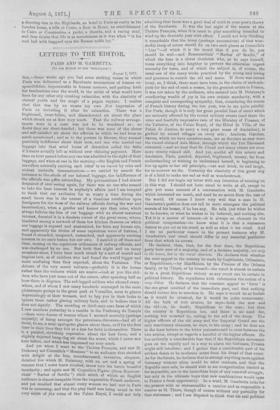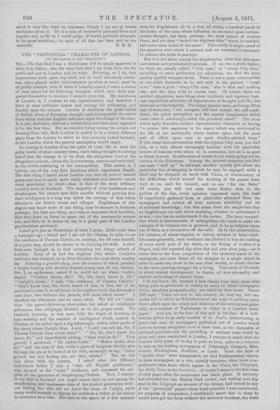LETTERS TO THE EDITOR.
PARIS AND M. GAMBETTA. [TO TIM EDTTOlt OR TUB "SPECTATOR."]
August 1, 1871. SIBt—Some weeks ago you had some striking verses in which Paris was delineated as a Bacchante unconscious of human re- sponsibilities, impenetrable to human sorrows, and putting forth her fascinations over the world, in the midst of what would have been for any other city crushing calamities, with the elasticity of eternal youth and the magic of a pagan rapture. I confess that that was by no means my own first impression of Paris on revisiting it after its calamities. There was a frightened, crest-fallen, and disenchanted air about the place which struck me at first very much. That the railway arrange- ments were in a mess was not to be wondered at ; no doubt they are short-handed ; but there was none of the clever and self-satisfied air about the officials to which we had been so much accustomed; and as to the porters in blouses, they seemed positively indifferent about their sous, and one who carried our luggage into that cruel house of detention called the Salle d'Attente actually left us without ever claiming payment. More than an hour passed before any one was admitted to the sight of their luggage, and when at one in the morning—the English and French travellers naturally exciting each °thee' to an entente by cries and violent umbrella demonstrations we carried by assault the entrance to the abode of our beloved luggage, the indifference of the officials was quite astounding. My porttnauteau I bad almost despaired of ever seeing again, for there was no one who seemed to take the least interest in anybody's affairs (and I am tempted to think that our exclusion for BO weary a time during the small hours was in the nature of a vicarious retaliation upon foreigners for the woes of the railway officials during the war and insurrection), when a gentler and keener eye than mine, which always follows the fate of our baggage with an almost maternal interest, descried it in a desolate corner of the great room, where, insulated among a network of those low kitchen dressers on which our luggage is exposed and anatomized, far from any human eye, and apparently the victim of some capricious wave of fortune, I found it stranded, unopened, untouched, and apparently exciting interest in no one's bosom but our own. I carried it off there and then, musing on the capricious ordinances of railway officials, and was challenged by no one. But both that night and on many occasions since, I have been much struck by a sort of scared and hapless look, as of children who had found the world bigger and more confusing than they expected, about the Parisians. The drivers of the very scarce voitures—probably it is the horses rather than the voitures which are scarce—look at you like chil- dren who have just come out of the corner, after spending half an hour there in disgrace. The red-legged soldiers who abound every- where, and of whom I saw many hundreds encamped in the most picturesque groups in the great park at Versailles, seem to glance deprecatingly at their trousers, and to beg you in their looks to ignore these rather glaring military facts, and to believe that it does not signify. The scowling or devil-may-care faces of which I saw numbers yesterday in a ramble in the Faubourg du Temple —there were dozena of women whom I accused mentally (perhaps unjustly) of being amongst the petroleum-throwers—had all of them, to me, a semi-apologetic glance about them, as if for the first time in their lives they felt at a lose for faith in themselves. There is a puzzled, shrinking expression about the best faces, and a slightly dejected hang-dog air about the worst, which I never saw here before, and which has impressed me very much. And yet when I went to the Theatre Francais, and saw n Delaunay act Corneille's ‘' Menteur " to an audience that shrieked with delight at the free, unembarrassed, inventive, eloquent, detailed lies which M. Delaunay, with an art and a spring of mauner that I never knew rivalled, threw into his hero's boastful mendacity ; and again saw M. Coquelin's Figaro (from Beaumar- chais' " Barber of Seville ") elicit mirth of which an English audience is almost incapable from the impressible French audience, and yet recalled that almost every woman we had met in Paris was in mourning, and that the play itself was being acted in the very midst of .the. ruins of the Palais Royal, I could not help admitting that there was a good deal of truth in your poet's theory of the Bacchante. It was the last night of the season at the
Theatre Francais, when it is usual to play something intended to wind up the dramatic year with effect. I could not help thinking it remarkable that the irony (perhaps unconscious) of that won-
derf el troop of actors should fix on two such pieces as Corneille's " Liar "—of which it is the moral that if you do lie, you should lie well—and Beaumarchais' "Barber of Seville," of which the hero is a clever chrtrlatan who, as he says himself, turns everything into laughter to prevent the otherwise urgent
necessity for tears, and of which the subject is, of course, the usual one of the many tricks practised by the young and loving and generous to outwit the old and mean. If there was covert irony, as, I think, there must have been, in the choice of such sub-
jects for the end of such a season, by the greatest artists in France, it was not taken by the audience, who entered into M. Delaunay's overflowing wealth of joy in his own artistic mendacity, with a complete and unsuspecting sympathy, that, considering the course of French history during the last year, was to me quite painful. For Paris, though it is only her great parallel lines of street which are seriously affected by the recent military events (and there the utter and fearfully impressive rain of the Ministry of Finance, of the Tuileries, of the Palais Royal, of the Intel de Ville, of the Palais de Justice, do carry a very great sense of desolation), is girdled by ruined villages on every side ; Asnieres, Garches, Sevres, which we have ourselves seen, are as desolate as ever were the ruined cities of Asia Minor, through which the Ten Thousand retreated,—and we hear that St. Cloud and many others are even more utterly ruined still. And yet, amidst all this misery and desolation, Paris, puzzled, dejected, frightened, uneasy, far from understanding or wishing to understand herself, is beginning to live up again to her old priuciple,—eat and drink, lie and laugh, for to-morrow we die. Certainly the elasticity of this great city is Of a kind to make one sad as well as wonderstruck.
But I did not begin my letter with any intention of running on in this way. I should not have cared to write at all, except to give you some account of a conversation with M. Gatnbetta which interested me much, and need be no secret from the rest of the world. Of course I know very well that a man in M. Garnbetta's position does not tell to mere strangers the political secrete of his breast, if he has any. He tells just what he wishes to be known, or what he wishes to be believed, and nothing else. Yet it is a matter of interest—it is always an element in the political computation—to know what it is that a statesman desires to give out as his creed, as well as what is his creed. And I see no particular reason in the present instance why M. Gambetta's real creed should differ in any essential particular from that which lie avows.
He declares, then, that, for the first time, the Republican party feels sure of a majority, and of a decisive majority, not only in the towns, but in the rural districts, He declares that whether the next appeal to the country be made by Legitimists, Orleanists, or Republicans,—by MaeMalion, by the Princes of the Orleans family, or by Thiers, or by himself—the result is almost as certain to be a great Republican victory as any event can be certain in political history. He repudiates with vehemence the notion of a coup d'itat, He declares that the constant appeal to ' force ' is the one great mischief of the immediate past, and that nothing should induce him to sanction it. lie says it would be as foolish as it would be criminal, for it would be quite unnecessary. All the bult. of both armies, he says—both the new and the old—is, no doubt, Republican to the core; but then the country is Republican too, and there is no need for, nothing but mischief in, calling in the aid of the Army. The higher officers of the old army and the Imperial Guard are the only. reactionary elements, he says, in the army ; and he does not in the least believe in the bitter jealousies said to exist between the two armies, except as regards a handful of the higher officers. He has evidently a considerable fear that if the Republican movement goes on too rapidly and in a way to alarm the Germans, Prussia might still interfere ; and I gather that a considerable part of his evident desire to be moderate arises from his dread of that event. As for the future, he declares that to attempt anything more against Germany without allies would be utter madness, and that the Republic once safe, he should wish to see reorganization carried as far as possible, not in the immediate hope of any renewed struggle, but only in the ultimate hope that now combinations would open to France a fresh opportunity. In a word, M. Gambetta talks for the present with as statesmanlike a caution and as responsible a reserve as M. Thiers, though of course without any partiality for that statesman ; and 1 am disposed to think that his real political
mind is very like what he expresses, though I am not of course credulous about it. He is a Irian of wonderful personal force and impulse and, as far as I could judge, of health perfectly adequate to his great arnbition,—in spite of all that has been said to the

































 Previous page
Previous page